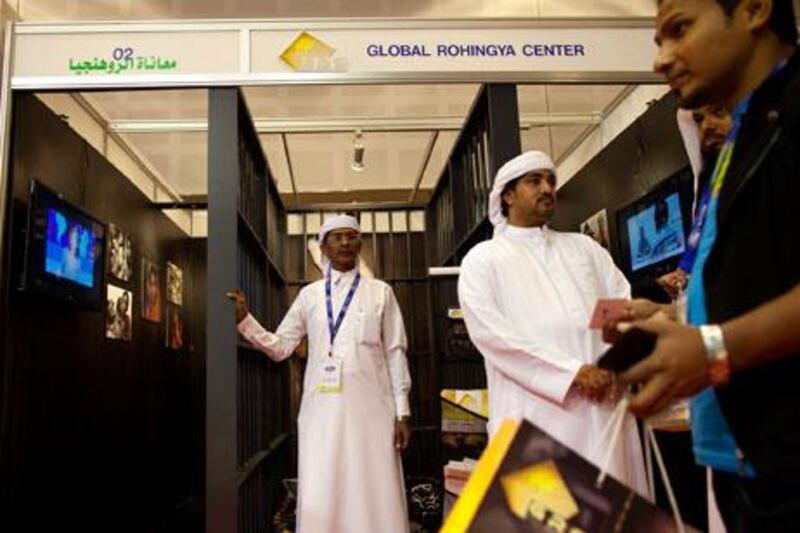DUBAI // A group of Rohingya have travelled to the UAE to highlight their people's plight to international aid organisations.
The Rohingyaare a Muslim minority from the predominantly Buddhist Myanmar.
Twelve of their people set up a stand at the 10th Dubai International Humanitarian Aid and Development (Dihad) conference and exhibition.
"Our mission is to empower the Rohingyas so they can communicate directly with international NGOs," said Amjad Romman, general coordinator of Bader Gateway, a Saudi Arabian charity that arranged the group's visit.
"The Dihad conference is a unique opportunity to get all these NGOs under one umbrella. This is the Rohingyas' chance to present their case in a language that NGOs, governments and the UN can understand."
The Myanmar government does not recognise the 800,000-strong population as one of about 130 ethnic minorities in the country.
The UN identifies them as the Indo-Aryan inhabitants of Arakan or Rakhine state in north-west Myanmar, which shares a border with Bangladesh.
Their roots are thought to date back to 1821, when the UK annexed the region as a province of British India and brought in large numbers of Bengali-speaking Muslim labourers, who later called themselves Rohingyas.
Mohammed Yasin, head of the Global Rohingya Centre in Saudi Arabia, who fled from Myanmar a year ago, said their presence in Dihad had helped to put a face to their cause.
"Visitors were enthusiastic when they knew they were talking to the Rohingyas directly instead of discussing our plight with NGOs," Mr Yasin said.
"They did not feel like we were an invisible group of people but were real."
Now settled in Mecca, he said the event was "a new arena that gave them the opportunity to meet with many local and international organisations".
He hoped more Rohingyas could come to next year's conference to again speak about their situation.
The UN's refugee agency says, thousands of Rohingyas have fled Myanmar to neighbouring countries because of "restrictions on movement, secondary education, marriage, livelihoods and the acquisition of skills".
Mr Romman said: "People can't get married without official permits, which are very difficult to get. Couples are allowed to have only two children. There is no access to work or education.
"This is the trial of humanity because it's an unprecedented scale of crisis. We have to keep this cause alive in the political and humanitarian arena."
The Dihad conference at the Dubai World Trade Centre aims to build effective and sustainable partnerships in humanitarian assistance and development.
On the final day yesterday, Dubai Police and Noor Dubai signed an agreement to expand the scope of work in preventing and treating curable blindness and low vision.
Dubai Police will contribute a total of Dh2 million over the next three years to Noor Dubai for their camps in Africa and Asia.
The money, which includes Dh500,000 the police donated last year, will help to restore vision, provide treatment for sight-threatening diseases, and provide education and training.






